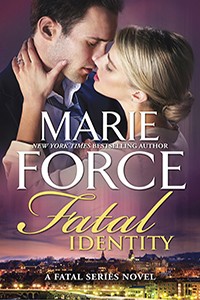Dear Readers…
Revision Week ends with a flourish thanks to the fabulous Marie Force, author of some of our favorite contemporary romance series. Marie has sold more than five million copies of her books worldwide, some self-published, others traditionally published. She is talented, prolific, and here to give us a glimpse into her process. Today also brings us to the grand finale giveaway: a Free Full Manuscript Edit by the Editor. Read the full post for giveaway details and Marie’s interview.
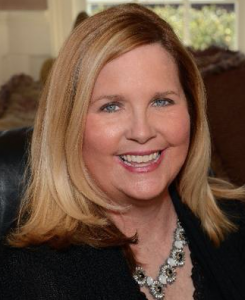 Marie Force is the New York Times bestselling author of over 50 contemporary romances, including the Gansett Island Series, which has sold more than 2.3 million books, and the Fatal Series from Harlequin Books, which has sold more than 1.2 million books. In addition, she is the author of the Green Mountain Series as well as the new erotic romance Quantum Series, written under the slightly modified name of M.S. Force. For more intriguing insights, pop over to Marie’s website and read her full bio to learn about her experiences as an author who works with traditional publishers while also self-publishing to great success. The tenth book in Marie’s Fatal Series, Fatal Identity, comes out July 26.
Marie Force is the New York Times bestselling author of over 50 contemporary romances, including the Gansett Island Series, which has sold more than 2.3 million books, and the Fatal Series from Harlequin Books, which has sold more than 1.2 million books. In addition, she is the author of the Green Mountain Series as well as the new erotic romance Quantum Series, written under the slightly modified name of M.S. Force. For more intriguing insights, pop over to Marie’s website and read her full bio to learn about her experiences as an author who works with traditional publishers while also self-publishing to great success. The tenth book in Marie’s Fatal Series, Fatal Identity, comes out July 26.
Marie’s interview follows the Rafflecopter form/entry link for today’s Free Full Edit by the Editor giveaway. Scroll down for her full interview.
You’ve told me you work toward a publishable first draft. How does being a “pantser” affect your efforts to reach “publishable” in a one draft? I write from the beginning and go straight through, going back repeatedly to the beginning to edit, tweak, refresh, update, and remind myself of what I need to get done in the remaining pages. Re-reading is a huge part of my process and usually sparks new plot ideas. I just did a re-read on my work in progress today to get back in the writing groove after the weekend.
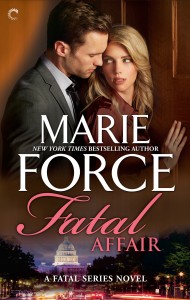
At what point will you typically stop to re-read? I stop to re-read whenever I feel the need to remind myself of where I started. Sometimes I do it frequently during the writing of a book and other times I only do it once or twice. It’s always a good reminder of where I’ve been and where I’m intending to go with the story.
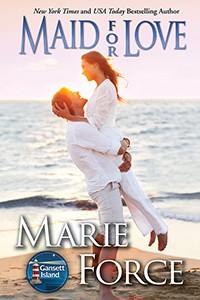 What role do critique partners, beta readers, or professional editors play in your process? I’ve never had critique partners. I don’t want another writer’s voice inside my head when I’m writing. I have three longtime beta readers and one of my team members acts as a front-line reader, too. They are helpful in identifying missing words (my specialty), questions that need to be answered, and any plot holes that might need to be addressed. I have a copy editor and proofreader for my indie books. My traditionally edited books get some minor developmental edits and line edits, but they are never much.
What role do critique partners, beta readers, or professional editors play in your process? I’ve never had critique partners. I don’t want another writer’s voice inside my head when I’m writing. I have three longtime beta readers and one of my team members acts as a front-line reader, too. They are helpful in identifying missing words (my specialty), questions that need to be answered, and any plot holes that might need to be addressed. I have a copy editor and proofreader for my indie books. My traditionally edited books get some minor developmental edits and line edits, but they are never much.
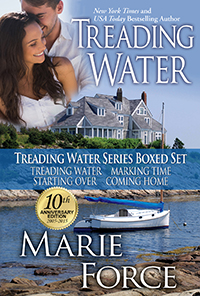 Your first book took you three years to write. Can you share a key insight or change in your process that have contributed to your current ability to write books in weeks and months? I learned all the biggest and hardest lessons with my first book, Treading Water, which I massively overwrote. I ended the first draft with a bloated 155,000-word manuscript in which I was highly indulgent of my muse. I’ve roped her into submission since then, and that’s never happened again. My second book, the follow-on to the first one, was written in 90 days and came in at 90,000 words. I’ve hardly touched a single word of it in the nearly ten years since I finished it. Whereas I continued to tweak and fine-tune the first one until I published it six years after writing The End. By then, it was a much leaner, meaner 92,000 words, and it was the same exact story. Those are the kind of lessons I didn’t need to learn twice. Now if a scene I want to write doesn’t move character X’s story forward in a meaningful way, it doesn’t get written. I’m pretty ruthless when it comes to getting rid of the bloat and keeping my story zipping forward.
Your first book took you three years to write. Can you share a key insight or change in your process that have contributed to your current ability to write books in weeks and months? I learned all the biggest and hardest lessons with my first book, Treading Water, which I massively overwrote. I ended the first draft with a bloated 155,000-word manuscript in which I was highly indulgent of my muse. I’ve roped her into submission since then, and that’s never happened again. My second book, the follow-on to the first one, was written in 90 days and came in at 90,000 words. I’ve hardly touched a single word of it in the nearly ten years since I finished it. Whereas I continued to tweak and fine-tune the first one until I published it six years after writing The End. By then, it was a much leaner, meaner 92,000 words, and it was the same exact story. Those are the kind of lessons I didn’t need to learn twice. Now if a scene I want to write doesn’t move character X’s story forward in a meaningful way, it doesn’t get written. I’m pretty ruthless when it comes to getting rid of the bloat and keeping my story zipping forward.
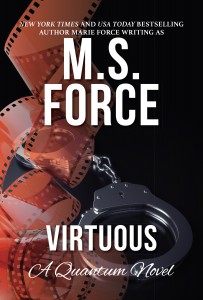 How do you know you’ve got the final draft? The last thing I do is read the manuscript on my Kindle, the way a reader would. By the time I get to The End, I’ve already edited the first half numerous times, so final edits tend to focus on the second half. Once I am able to read the book all the way through without stopping for any reason, it’s done. That usually happens fairly close to actually finishing the writing, because I’ve been fine-tuning all along. That’s how my first draft becomes a finished book.
How do you know you’ve got the final draft? The last thing I do is read the manuscript on my Kindle, the way a reader would. By the time I get to The End, I’ve already edited the first half numerous times, so final edits tend to focus on the second half. Once I am able to read the book all the way through without stopping for any reason, it’s done. That usually happens fairly close to actually finishing the writing, because I’ve been fine-tuning all along. That’s how my first draft becomes a finished book.
Thank you, Marie!
You can follow Marie on Facebook, Twitter @marieforce and on Instagram, join one of her many reader groups, and get on her mailing list for news about new books and upcoming appearances in your area. Contact Marie at marie@marieforce.com.
